I Dig Sports

KOKOMO, Ind. — Driving his second car in as many nights, Thomas Meseraull cruised to his first USAC AMSOIL National Sprint Car Series victory of the season on night one of Sprint Car Smackdown VIII at Kokomo Speedway.
On Wednesday Meseraull led laps aboard the No. 23s Simon Racing entry. Thursday night he was aboard Tom Eades’ No. 47, giving the first-year car owner his initial USAC triumph.
Meseraull knew he had to put together a complete night to provide himself his best shot to collect a USAC AMSOIL National Sprint Car win for the fifth-straight year, something accomplished only by five other drivers: Brady Bacon, Justin Grant, Chase Stockon, Kevin Thomas, Jr. and Chris Windom over the same time span since 2015.
“After (Indiana) Sprint Week, we got our ass handed to us, flat out,” Meseraull admitted. “We just got beat. It was a little unexpected. I had to qualify a little better tonight, and I did, which put us up front. Track position in these deals is everything. It’s everything.”
Meseraull began his journey from the outside of the front row, but it was Bacon who took control early on, sliding from his pole starting position to the top in turn one to lead the opening seven circuits with Meseraull in tow, trailing the two-time series champ a couple car lengths behind.
The first stoppage of the night came on lap seven when the night’s ProSource Hard Work Award winner and 19th running Josh Hodges flipped upside down in turn four.
Once racing resumed, Meseraull stuck right with Bacon, and on the ninth lap, made his bid for the lead, dipping to the bottom of turn one and sliding up in front of Bacon for the top spot. With tension high and the competition at a peak level, Meseraull knew there was no time to putt around in second.
“It was so slick to the curb, and the curb was on the wall. It was as tall as me, I swear,” Meseraull recalled. “It was so big out there, I knew I couldn’t waste any time. After the red flag, we ended up parking there right off of three and realized that it wasn’t slick to the curb. It had a big hole before the curb, like the track had gotten ate up and it had this big dip and my car was evil up there. I’d hit it and it’d get up on two wheels. I just started going in above it in three and cheating across it and driving to the slick. That hole got Brady one lap, and I knew I had to just bomb it in there and hope to God that it would stick, and it stuck.”
Meanwhile, as the battle for the lead switched hands, fourth-running C.J. Leary biked entering on the bottom of turn one. The series point leader miraculously saved his mount without flipping or making contact, but the landing is what got him, flattening his left-rear tire before slowing to bring out the yellow.
On the 10th lap restart, Bacon went to work on the bottom underneath Meseraull for the lead in turn one, however Meseraull retained the momentum on the high side as did Courtney back in third. While Bacon trekked the low line, Courtney stuck to the top and raced around the outside to nip Bacon at the line for second and nail down the position exiting turn two.
Courtney put the chase on Meseraull, diamonding off the third turn as well as following him on the top shelf to find a way to close the gap. On the 12th lap, though, Courtney got in above the cushion a bit off turn four, allowing Meseraull to jump away and build his lead to nearly a full straightaway (2.729 seconds) just after the midway point.
On the 17th lap, Logan Seavey slowed to a stop on the bottom of turn one, erasing Meseraull’s substantial advantage just prior to hitting lapped traffic.
It hardly seemed to make a difference to Meseraull once the green flag dropped on the restart with 13 to go where he once again utilized the high line to break away from Courtney, holding a half-straightaway advantage down the stretch with only lapped traffic to contend with in the final five-lap push.
Meseraull skimmed the outside concrete in turn two with two to go, with no tiptoeing around the outside of the lappers occurring whatsoever, as he closed out a sterling performance with a 1.339-second victory over Courtney, Justin Grant, Brady Bacon and Chase Stockon.
To see full results, turn to the next page.
Tagged under

Pierre-Emerick Aubameyang has said Arsenal can match Liverpool up front by starting him alongside Alexandre Lacazette and Nicolas Pepe when the two sides meet at Anfield in the Premier League on Saturday.
Liverpool's attacking trio of Mohamed Salah, Sadio Mane and Roberto Firmino combined for 69 goals and 19 assists in all competitions last season, and Aubameyang labelled them "one of the best trios in the world."
- ESPN Premier League fantasy: Sign up now!
- Cartlidge: Ceballos can be missing link to Arsenal's midfield
"As we've seen from last season, Liverpool play with three up front and they play very well. Why not us? I think we can do it," Aubameyang told Sky Sports.
"I see a lot of similarities. Pepe and me, we are quick players like Mane and Salah, while 'Laca' is a player who can keep the ball and is really good with his feet like Firmino. So yes, we can say we are close enough."
Pepe, who cost Arsenal a club record £72 million, scored 22 league goals and provided 11 assists for Lille last season and Aubameyang is looking forward to seeing what he can bring to the attack when the three link up on the pitch.
"First of all, he speaks French so it will be easy for him to settle in and play with us," he added. "He only started training with us a few weeks ago but it's good to have him with us. He's started well.
"Last season he was amazing. He'll bring us speed and excellent finishing."
Accommodating all three in the starting lineup would require a change in formation but Aubameyang has no qualms about moving from the striker role to play out wide.
"I've played a lot of times on the right and the left during my career, so I'm used to it. It's a bit of a different job," he said.
"When you are a striker you have to keep hold of the ball and you have to score goals. When you are out wide you have to run and defend a bit more than if you are playing as a striker through the middle. But it's not a problem."
Tagged under

Hungarian shock for Allegro-Lambiet
The Belgian pairing of Martin Allegro and Florent Lambiet were in for a shocker as they faced Hungarians Nandor Ecseki and Adam Szudi for a place in the semi-finals.
Ecseki-Szudi started strong and that itself seemed to shake up the Belgian duo. The match lasted barely 25 minutes in which the Hungarians claimed a deserved victory (11-5, 10-12, 11-6, 11-7). Over at Table 1, Austrians Robert Gardos and Daniel Habesohn knocked out Hong Kong’s Ho Kwan Kit and Wong Chun Ting in a fairly similar manner (11-8, 10-12, 11-2, 11-3).
“We are very happy to win this game. We lost against them last two or three matches but today we were well prepared. We tried to open the game more not to play too much short. And also we moved really well today. But it was very close we were 1-0 and 9-7 up and we lost the game so it was 1-1. But after we played really concentrated we didn´t make almost any easy mistakes and that was the key to the victory. We also had many lucky balls which are very important in table tennis. In doubles it is going really fast it is very important to start the set well then you have more confidence. We had a really tough draw in the 1st round we won 3-2 against strong Chinese pair so we are happy that we survived.” – Robert Gardos and Daniel Habesohn
Not a “Guten Tag” for Dang-Nina
After coming back from the jaws of defeat yesterday, the morning game between German duo of Qiu Dang and Nina Mittelham and their Brazilian opponents was one to look forward to.
Qiu and Mittelham sadly could not channel yesterday’s energy as they lost in straight games (11-8, 11-8, 11-7). Meanwhile, China’s Ma Te and Wu Yang – the conquerors of top seeds Lee Sangsu and Jeon Jihee – lost out to their Korean compatriots Cho Daeseong and Shin Yubin in a close encounter (4-11, 11-4, 11-8, 11-7).
And the action continues!
Follow the action live by keeping up to date on the match schedule for the day:
Tagged under
Mallinder quits England set-up to become Scotland's performance director
Published in
Rugby
Friday, 23 August 2019 00:20
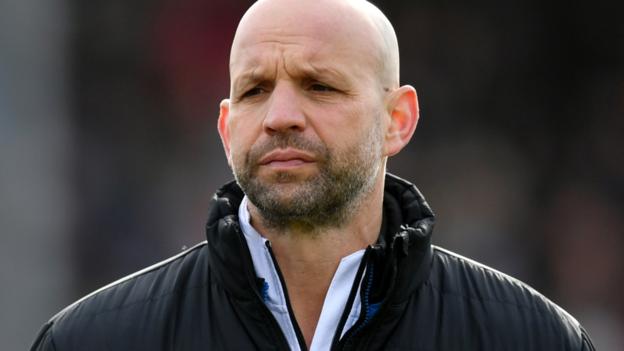
Jim Mallinder has left his post with the England set-up to become Scottish Rugby's new performance director.
He replaces Scott Johnson, who returned to his native Australia this summer to take a similar role with the Wallabies.
Mallinder, 53, took charge of England's young player pathway system in June 2018 after spells as head coach of Sale Sharks and Northampton Saints.
He is relishing his "exciting" new role and is "really impressed with the set-up in Scotland already."
"It was clear that this was an outstanding opportunity to really set the direction of travel for Scotland's high-performance ambitions," Mallinder added.
He will oversee the pathway from the feeder system into Scotland's two professional teams, the national men's and women's 15-a-side and sevens teams.
"I am delighted to have secured Jim in what is a pivotal and vital role within our high-performance structure," said Scottish Rugby chief executive Mark Dodson.
"He has a proven track record of developing players across a range of different career stages."
Mallinder, capped twice by England, led Sale to European Challenge Cup victory in 2002 in his first coaching role, before steering England Under-21s to the Six Nations title four years later.
He guided Northampton to promotion to England's top flight, winning the title in 2014. Saints also reached the 2011 European Cup final and won the European Challenge Cup and Anglo-Welsh Cup during his 10-year tenure.
'It looks a very good appointment'
BBC Scotland chief sports writer Tom English
He's very experienced. It looks like a very good appointment. He has an excellent track record in coaching at Sale and Northampton, where he won a Premiership title.
He has been a director of rugby before, so he knows the job. He was mentioned as a possible successor to [England head coach] Eddie Jones, so this will be seen as a bit of a blow for the RFU that he's leaving.
It could be considered a coup for Scottish rugby but we'll wait and see.
'England facing age-grade coaching crisis'
BBC rugby union correspondent Chris Jones
Mallinder's departure leaves the RFU facing an age-grade coaching crisis.
The RFU's head of international player development Dean Ryan and Under-20s head coach Steve Bates have also quit their roles in recent months.
And long-standing Under-18s coaches John Fletcher and Peter Walton were sacked by Ryan last June.
It leaves RFU bosses desperately needing to establish a completely fresh coaching set-up to support the senior side and help develop players through the age-groups.
Chief executive Bill Sweeney has already stated his intention for Eddie Jones to continue as head coach after the forthcoming World Cup even if England don't reach the semi-finals.
Tagged under
Pogba, Rashford can share penalty duties - Solskjaer
Published in
Soccer
Friday, 23 August 2019 03:50
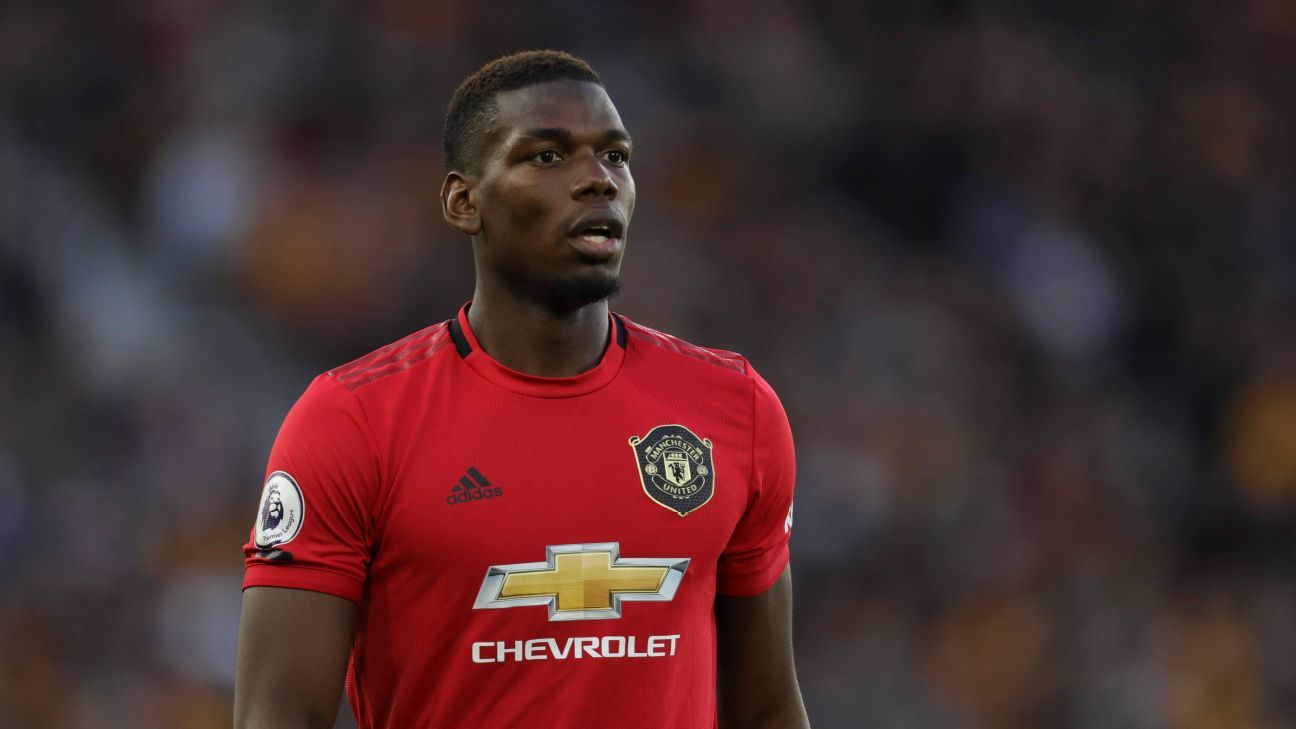
MANCHESTER, England -- Ole Gunnar Solskjaer says he will continue to let Marcus Rashford and Paul Pogba decide on the pitch who takes Manchester United's penalties despite a costly miss from the spot against Wolves.
Pogba saw his kick saved by Rui Patricio to deny United victory at Molineux after the Frenchman, who has missed four penalties in the last year, pulled rank on Rashford.
The on-field debate drew criticism from former United player Gary Neville but Solskjaer insists he has not changed his policy ahead of Crystal Palace's visit to Old Trafford on Saturday.
"I'm sure you're going see Paul Pogba score a pen for Manchester United again," Solskjaer told a news conference on Friday.
"We're practising [penalties] still and Marcus and Paul are still on them.
"Don't be surprised if Marcus or Paul scores the next one. There was absolutely no fighting amongst them.
"We've nominated two [takers] and throughout the season you'll have games where they are not playing and it's good to know they're there and trusted to take pens.
"It's not like anarchy and they can do whatever they want, we have a few. Last year we had Marcus, Jesse [Lingard] and Paul, it's not just left to them."
Pogba was subjected to racist abuse on social media following his penalty miss, prompting the club to brand the behaviour of those responsible as "disgusting".
Solskjaer has spoken to the midfielder since the incident on Monday night and insists the 26-year-old is ready to play against Palace.
"Paul is fine," Solskjaer said.
"He's a strong character and it makes him stronger. When you speak to him he's fine and I just cannot be believe we're still here in 2019 talking about these instances."
Meanwhile, the United manager has refused to hit back with Romelu Lukaku after the Belgium international said he "didn't feel protected" during a summer of speculation about his future.
Solskjaer, however, did suggest again that Alexis Sanchez could leave Old Trafford before the European transfer deadline on Sept. 2.
Talks are continuing with Inter Milan over a potential loan deal although sources have told ESPN FC that an agreement is not yet close.
"There are still talks with some clubs," Solskjaer said.
"He played [behind closed doors against Sheffield United] and played well. He's working hard and let's see in September what's going to happen."
Tagged under
Will Liverpool change style vs. Arsenal to help Adrian?
Published in
Soccer
Friday, 23 August 2019 01:30
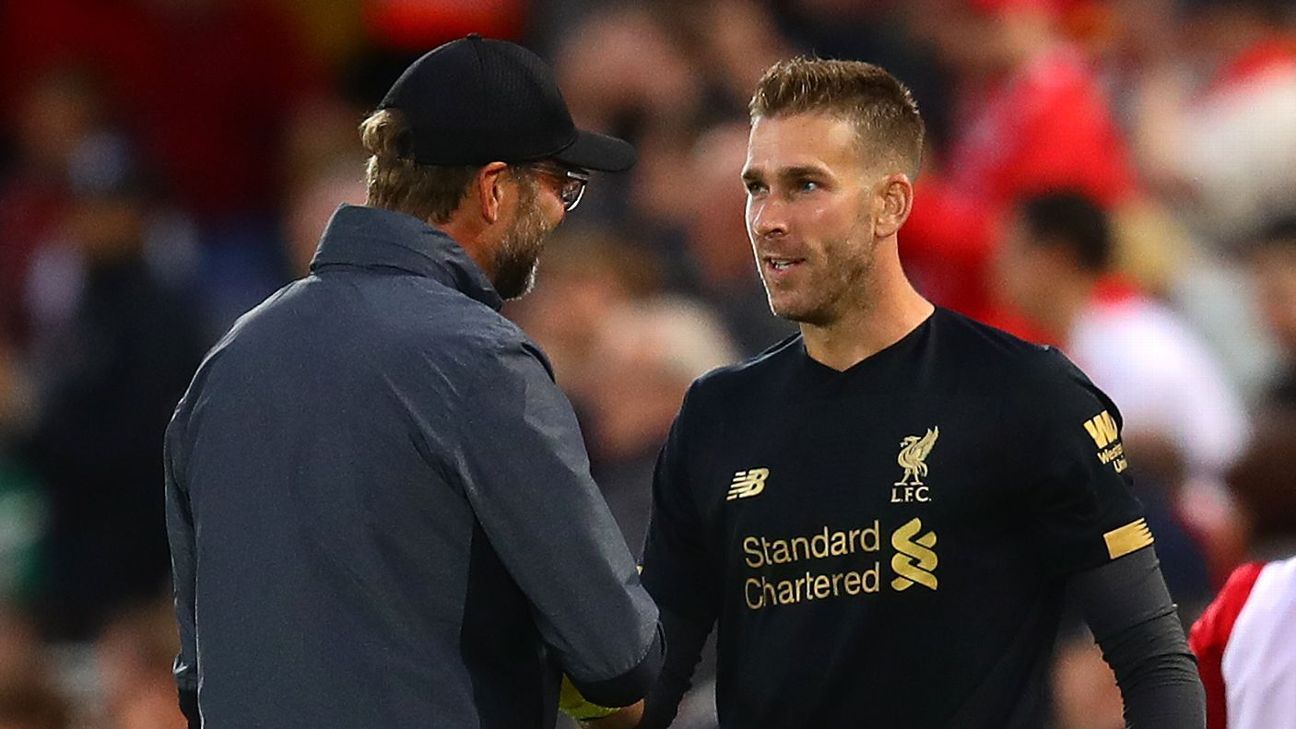
Two games in and there are already a handful clubs out of form, amid injury crisis, or just plain bad. Here are the the storylines to look out for ahead of matchday three.
Jump to: Where is Lucas? | Chelsea need Rudiger | Watford can't afford loss | No VAR, please
Will Liverpool have to change their approach?
It's the weekend's big game, an encounter between two clubs who sit atop of the nascent and entirely irrelevant Premier League table with 100 percent records. Liverpool vs. Arsenal has proved a slightly low-key but nonetheless spicy rivalry in recent years, providing thrilling games and occasional moments of brilliance.
Liverpool look to have started this season from where they left last term, with two wins so far and a couple of very satisfactory performances against Norwich and Southampton, but you wonder whether they might have to alter their style in the absence of Alisson, purely because of how the Brazilian uses his feet.
- ESPN Premier League fantasy: Sign up now!
- All Premier League summer transfers
- Reddy: Adrian's first two weeks at Anfield
In some respects it's unfair to expect any replacement to play as Alisson does, but his absence will surely alter the way Liverpool approach the game. With their first-choice in goal, they know that he will smartly play out from the back, and that his footwork in general compares to many outfield players, and the reassurance that he brings allows them to play with their standard intensity.
However, with the ball at his feet, Adrian -- the aforementioned replacement -- sometimes looks like he has been presented with a spherical explosive for some reason, treating it with the utmost suspicion and tries to get rid of it as quickly as possible. All of which in turn obviously creates uncertainty with everyone else. He has already given away one calamitous goal, laughed off by Jurgen Klopp, but you suspect another similar incident is more than possible.
Ultimately, Klopp must decide which of the two following options is least risky: Carry on in their current style and hope Adrian gets things right, or change things up and trust the rest of the team will get things right?
Why hasn't Lucas been in the Spurs team this season?
No player at a top six club can feel entitled to a place in their team every week, but can feel they're more deserving than others.
Take Lucas Moura for example: Hero of Tottenham's win over Ajax in last season's Champions League semifinal, he was left out of the final in favour of Son Heung-min. It was an understandable, if not harsh, call given how good Son has proved himself to be.
But with Son suspended for the first few games of the season, logically you would think that Moura would step in, but he's yet to start any of Tottenham's big games thus far. The question you would have to ask is: Why?
With Son out, Lucas would logically seem to be the Spurs forward who provides the closest sort of threat to the South Korea international, but he's been left on the bench in favour of Erik Lamela so far.
Why Mauricio Pochettino has not called upon the Brazilian winger is a mystery to which he will only the answer, but you can't help but feel that Spurs would be a much more threatening with him in it.
Will Lucas get a chance against Newcastle this weekend?
Rudiger return key for Chelsea
If you were to run a poll last season to identify Chelsea's most important player, Antonio Rudiger would have been a long way down the list. However, he might have been bumped a long way up the ladder after Chelsea's opening games of the season.
At times during their 1-1 draw with Leicester last Sunday, it felt like Chelsea were playing kamikaze football, attacking and attacking but leaving acres of space on the counter, and ultimately they were fortunate their opponents didn't take more of the chances that presented themselves.
There has been an element of chaos to the Chelsea defence under Frank Lampard, which you could put down to a certain amount of inexperience, or simply a lack of quality in their defenders. Rudiger, fit again after missing the opening weeks of the season with a knee injury, could help solve both of those problems, and having a top class central defender in the side will be even more important if Lampard's Chelsea carry on playing as they have been.
2:06
FIFA Predicts - Liverpool vs. Arsenal
David Luiz and Matteo Guendouzi's similar hairstyles are causing all sorts of confusion in The Exploding Heads' Liverpool vs. Arsenal preview.
Watford need a win to calm some nerves
Among the clutch of clubs gathering at the edge of the big six, ready to pluck the weakest from the pack if one drops away, Watford were at the very least outside contenders. Leicester, Wolves and Everton all have their chance, but the steady improvement of Javi Gracia's side over the past couple of seasons means the Hornets are surely one candidate to make a step up this term.
They might be slightly concerned therefore to have lost their opening two games of the season, and not to the most fearsome opposition the Premier League has to offer, either. A narrow away defeat to Everton is forgivable, but even Gracia admitted there was no excuse for the abject 3-0 loss to Brighton on the opening day.
These are still absurdly early days, but it will at the very least calm a few nerves at Vicarage Road if they can beat West Ham at home on Saturday. If not, alarm bells will be ringing.
Allow us just one VAR-free weekend
If there is some sort of football deity up there, an all-powerful force who controls everything that happens in the game, can we please ask this, just one time; please, no VAR incidents this weekend. Please. We beg of you.
We are only a couple of weeks into the new season and already the debates are circular and tedious, two sides of the argument unable or unwilling to see the other side's point, discussions about what this huge change is doing to football.
We are realistic. We know this is here to stay. We know the coming years will be broadly dominated by this one subject. This is inevitable. But we just need a little break, one weekend where we can concentrate on the football, and only the football. Please. We don't ask for much. But please give us this one, small thing.
Please.
Tagged under
Boult, Southee double-strikes make it New Zealand's morning
Published in
Cricket
Friday, 23 August 2019 01:16
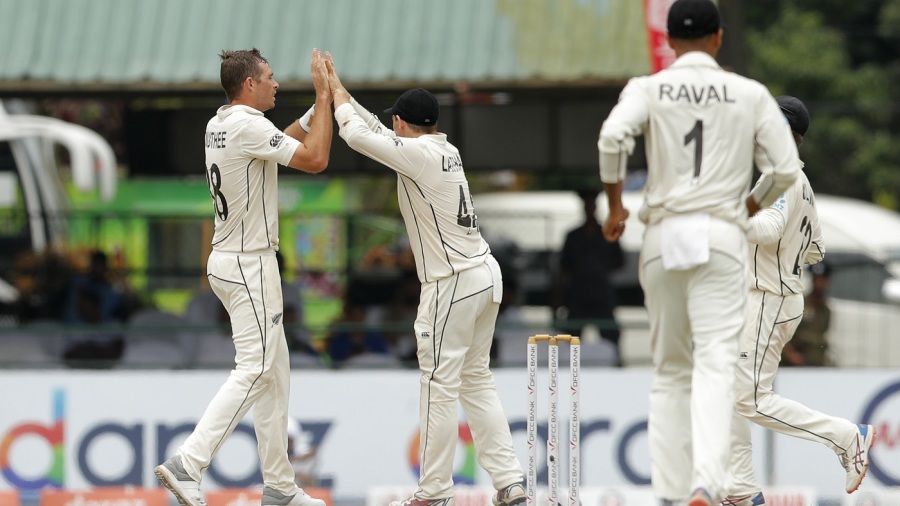
Lunch Sri Lanka 144 for 6 (Dhananjaya de Silva 32*, Dilruwan Perara 5*, Boult 2-33, Southee 2-40) v New Zealand
Two double-wicket maidens by New Zealand's seam-bowling duo of Trent Boult and Tim Southee headlined an opening session that left Sri Lanka struggling on the second day of the second Test.
Sri Lanka had resumed on a fairly steady 85 for 2 after overnight rains delayed the scheduled start by 45 minutes, and with captain Dimuth Karunaratne gliding a single to third man to bring up a 23rd Test half-century early on, they looked in good shape. Then Boult struck.
In his third over of the day, Boult had Angelo Mathews as Victim No. 250 in Test cricket, caught down the legside trying to pull a short ball that didn't come on as quickly as he expected. Four balls later, Boult got one to jag back in from a length to Kusal Perera, who completely misread which way the ball was travelling. He shouldered arms as the ball thudded into his pads. Not offering a shot and with the ball hitting him right in front, he wisely opted not to take a review and walked off.
From a steady 93 for 2, Sri Lanka were a wobbly 93 for 4, with only Karunaratne's continued presence at the crease offering some succour. The captain built a steady stand with a skittish Dhananjaya de Silva, who was fortunate to survive when he lobbed a leading edge off Boult before he was into double figures. Boult, whose ever-growing gallery of breath-taking catches on the boundary often sends social media into a tizzy, saw an absolute dolly pop in and out of his hands.
Dhananjaya was still living on edge, with the ball not always meeting the middle of the bat and one inside edge whizzing past the stumps to the boundary. But he hung on to survive the session.
Karunaratne's solidity at the other end meant Sri Lanka looked like they were climbing out of the hole Boult had dug for them, only for Southee to push them right back in. Southee kept angling the ball across the left-handed Karunaratne, varying his movement and lines subtly. Dragged across by Southee's lines until one was pitched on the perfect length, he was tempted into the drive, and edged into BJ Watling's gloves.
Three balls later, a leaden-footed Niroshan Dickwella was caught on the crease as another edge went to Watling, and Sri Lanka were in fresh trouble. Dhananjaya held on till the lunch break, while Dilruwan Perera copped a blow on the glove of his bowling hand which needed treatment, a potential further cause for worry for the home side.
Tagged under
RCB support staff overhaul: Kirsten and Nehra out, Hesson and Katich in
Published in
Cricket
Friday, 23 August 2019 02:57
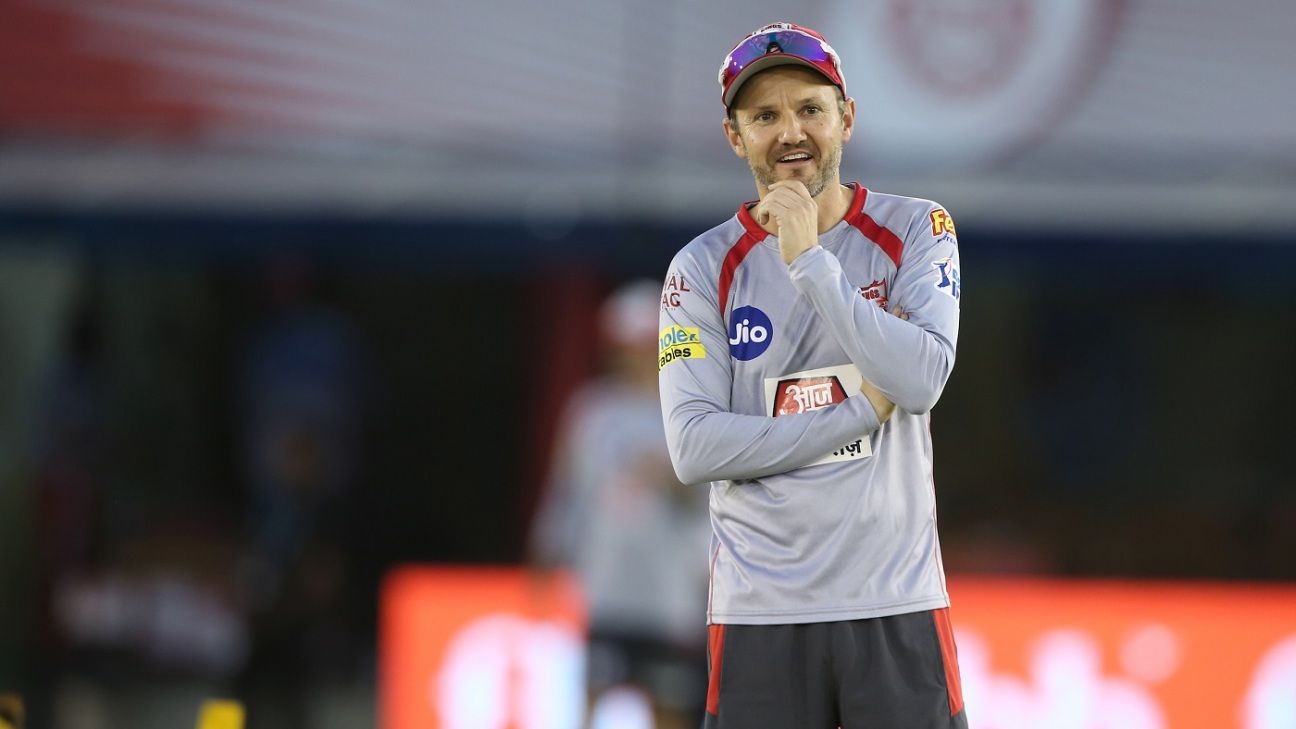
Royal Challengers Bangalore have announced a major overhaul to their support staff, sacking Gary Kirsten and Ashish Nehra as the batting and bowling coach respectively, and bringing in Mike Hesson as director of cricket and Simon Katich as head coach.
Nehra, the former India pacer, and Kirsten, the former South Africa batsman with vast coaching experience including with India during their 2011 World Cup win, had been appointed in 2018 after former New Zealand captain Daniel Vettori was removed as head coach following the 2018 season. Both Nehra and Kirsten were part of the leadership group along with Royal Challengers' captain Virat Kohli since then. However, the team that had made the final in 2016, finished sixth in 2018 and were the wooden spooners in IPL 2019, leading to a rethink in the management.
According to Sanjeev Churiwala, the Royal Challengers chairman, the move to switch to a single-coach model became necessary because the franchise wanted to achieve "high performance".
"RCB's purpose is to be the most trusted, respected and best performing T20 franchise and hence our constant endeavour is to create a culture of excellence and high performance for every member of the team," he said in a media statement.
Churiwala said both Hesson and Katich had the necessary experience to create a "winning culture" at Royal Challengers, who have never won the IPL despite reaching the final thrice. "We believe that Mike's extensive experience in building strong teams along with Simon's powerful cricket experience will help us create a winning culture. As a result of this restructuring exercise, we will be moving to a single coach model."
More to follow...
Tagged under
Flores: Jay-Z songs intended to 'challenge' Stills
Published in
Breaking News
Friday, 23 August 2019 00:45
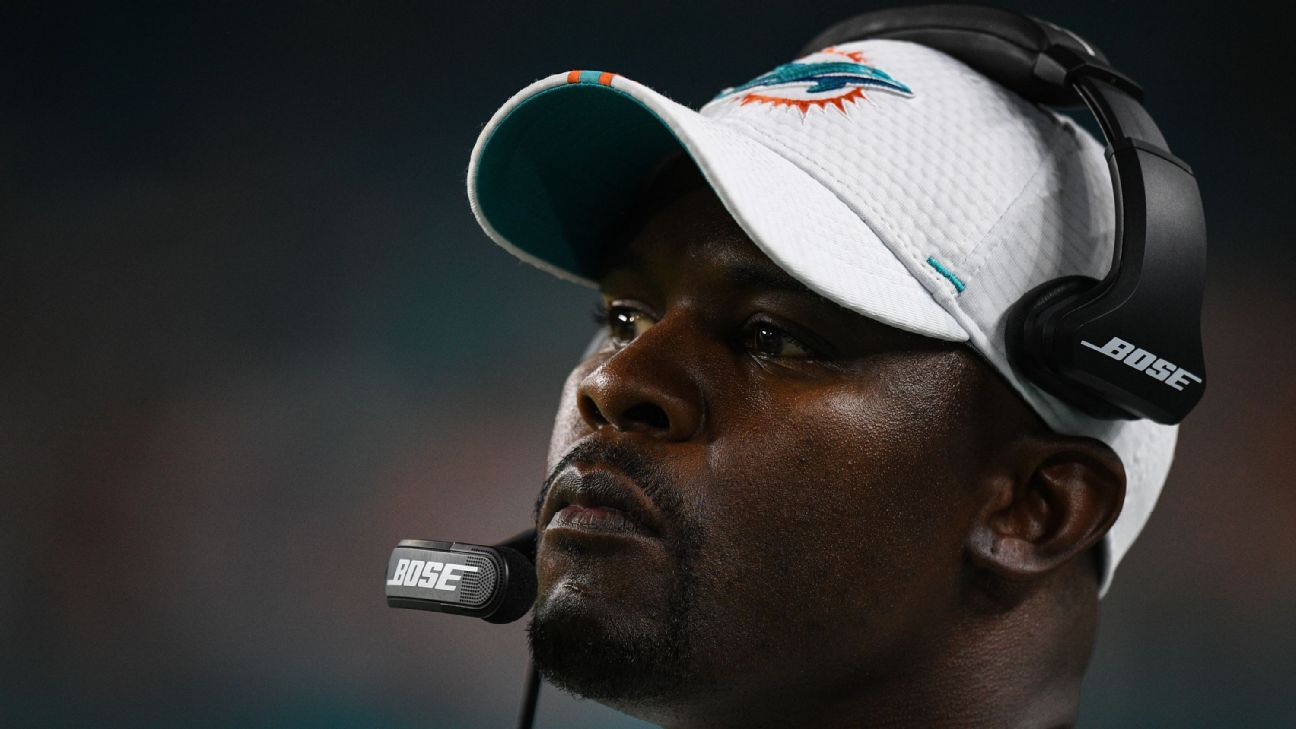
MIAMI GARDENS, Fla. -- Miami Dolphins coach Brian Flores passionately defended his decision to play eight consecutive Jay-Z songs during Tuesday's practice just one day after receiver Kenny Stills expressed disdain about how the hip-hop mogul went about his social justice partnership with the NFL.
As word of the stunt percolated throughout social media and the internet, many speculated on Flores' motives for seemingly trolling one of his veteran players. Thursday, after the Dolphins' 22-7 preseason win over the Jaguars, Flores was emotional in explaining his reasons behind the action. He said the criticism about whether he supports what Stills stands for is without merit.
"It was a challenge to Kenny to perform regardless of whatever is going on outside," Flores said of playing the Jay-Z songs. "I would say, and I said this to him, he hasn't performed up to that level over the course of training camp, or as I've seen. So that was the challenge -- to get open, catch the football and make plays for this team, regardless of what's going on outside of this building."
The move seemed puzzling at the time because it caused another distraction for a Dolphins team that has been littered with non-football storylines this month. It was a Flores-induced distraction done very visibly in front of the media in response to something he was worried might be a distraction for one of his players.
Flores' decision to play the Jay-Z songs at practice -- clearly an overnight decision, given the freshness of Stills' comments about Jay-Z -- might be perceived as a former Patriot assistant-turned-head coach playing Jedi mind games with one of his key players.
But Flores said he has put his words behind now. He made it clear that he feels, as the Dolphins coach, he can motivate his players however he chooses. He made the challenge to Stills in front of the team after the Jay-Z playlist was done. Then, after being surprised by the media attention this story received, Flores said he got up in front of the team the next day to tell them that he supported Stills and the player protest.
"We talked about it in-house and he handled it in-house," Stills said. "For the most part, I think it was him seeing if I could handle if people were going to heckle me or play Jay-Z in another stadium if I could be mentally strong enough to handle that sort of treatment. I've been dealing with this since 2016 -- music, boos, racial slurs. So I don't think a little Jay-Z music is going to ruffle my feathers that bad."
Since 2016, Stills has been at the frontline of the NFL player protest movement. Every game, including Thursday night, Stills has taken a knee during the anthem to bring awareness to police brutality, social injustice and systemic oppression.
Flores seemed surprised that his support for Stills' cause would be questioned. He took a breath and explained why he relates to Stills', Colin Kaepernick's and Eric Reid's protests so much.
"Quite honestly, they're bringing attention to my story," said Flores, a native of Brooklyn (Brownsville), New York. "I'm a son of immigrants. I'm black. I grew up poor. I grew up in New York during the stop-and-frisk era. So I've been stopped because I fit a description before. So everything that these guys protest, I've lived it, I've experienced it. So I applaud those guys' protest. So whether it's Kaepernick, or Eric Reid or Kenny, I applaud those guys. I told Kenny that in our meeting in front of the entire team.
"I don't know how many people have, but I lived it. So I understand why guys protest. And it's important. And you know what else is important to me? There's 89 guys in that locker room who are counting on Kenny to get open, catch the football and perform for this team. That's important to me. And if anybody's got a problem with that, then we've just got a problem. We're going to agree to disagree. I feel like that's important and that's where I stand on this thing."
The Dolphins obviously want to move on from this moment and get back to football. Still said that he doesn't believe it is a big deal.
"It's just music," said Stills, adding that he doesn't want this to be any more of a distraction than it already is.
The rest of the Dolphins' locker room seems to be taking it in stride, even ribbing Stills about it.
On Monday, Stills criticized Jay-Z for how he went about forming a social justice partnership with the NFL, particularly his remark that "we've moved past kneeling, and I think it's time to go into actionable items."
"He's not a NFL player. He's never been on a knee," Stills said earlier this week. "Choosing to speak for the people like he had spoken to the people. ... I wonder how many common people that he knows or has spoken to. I wonder if he's read my Facebook comments or my Instagram comments or some of the things people say to me. To say we're moving past something, it didn't seem very informed."
Tagged under
Inside the Dodgers' wild run of walk-off comebacks
Published in
Baseball
Friday, 23 August 2019 00:16

It has pretty much become a matter of not "if" but of "who" and "how" this season at Dodger Stadium.
On Thursday night, "who" was Enrique Hernandez, with assists from Corey Seager and Cody Bellinger (who else?), as the Los Angeles Dodgers pulled off their latest walk-off win, overcoming a 2-0 deficit with three runs in the bottom of the ninth to beat the Toronto Blue Jays 3-2.
It was not only the Dodgers' 12th walk-off win of the season (and second in two nights), but also the seventh time they have won when trailing entering the bottom of the ninth.
A few nuggets from ESPN Stats & Information research about just what that means:
-- The 12 walk-off wins are the most by the Dodgers in a season since 2012 and the most by any team since the 2017 Orioles (who also had 12).
-- The Dodgers' seven wins when trailing entering the bottom of the ninth are the most such wins by any team in a season since 2009. No other team this year has more than three.
-- The Dodgers improved to 51-16 at home for the season. Their .761 winning percentage would be the best in a season since the 1998 Yankees.
Here's a look at L.A.'s seven walk-off comeback wins:
Aug. 22: Dodgers 3, Blue Jays 2
Toronto's win probability entering bottom of ninth: 88.7%
The Dodgers trailed 2-0, and had just one hit -- a single by pitcher Kenta Maeda -- entering the bottom of the ninth. Max Muncy led off with a walk against Toronto's Derek Law. Following a Justin Turner line out, Bellinger doubled to put runners on second and third, and Seager's two-run double tied it. Hernandez followed with a soft liner to center for his first career walk-off hit, on his bobblehead night no less.
Aug. 7: Dodgers 2, Cardinals 1
St. Louis' win probability entering bottom of ninth: 76.8%
The Dodgers trailed 1-0 as Jack Flaherty and Giovanny Gallegos limited the Dodgers to five hits in the first eight innings. With one out in the ninth, Andrew Miller hit Seager with a pitch. Carlos Martinez then came in for St. Louis and gave up a single to pinch hitter Will Smith. Following a strikeout, a Martinez wild pitch put runners on second and third, and Russell Martin singled on a 98-mph fastball to score two for a 2-1 L.A. win.
Aug. 4: Dodgers 11, Padres 10
San Diego's win probability entering bottom of ninth: 76.6%
The Padres scored twice in the top of the eighth to take a 10-7 lead, but L.A. cut it to 10-9 entering the ninth. With one out, Muncy ripped his fourth hit of the night, a two-run, walk-off double off San Diego closer Kirby Yates, who had an ERA just north of 1.00 at the time. "It never gets old," Muncy said after the celebration.
July 3: Dodgers 5, Diamondbacks 4
Arizona's win probability entering bottom of ninth: 82%
The D-backs took a 4-3 lead in the top of the ninth, but Hernandez led off the bottom of the inning with a double and scored on a single by Matt Beaty to tie it. Then with one out in the 10th, Bellinger hit his second homer of the night, giving the Dodgers a walk-off win in their fifth straight home game.
July 2: Dodgers 5, Diamondbacks 4
Arizona's win probability entering bottom of ninth: 83.4%
After the Diamondbacks' Greg Holland got two quick outs with the Dodgers trailing 4-3, Arizona's win probability got as high as 97.9%. Then things unraveled for Holland, who walked four straight batters to force in the tying run. T.J. McFarland was called on to clean up the mess but walked Bellinger on six pitches to bring home the winning run.
May 29: Dodgers 9, Mets 8
New York's win probability entering bottom of ninth: 94.9%
The granddaddy of them all. The Dodgers trailed 8-3 entering the bottom of the seventh, and were still down 8-5 entering the ninth and facing Mets closer Edwin Diaz. In just 30 pitches, the Dodgers went Joc Pederson homer, Muncy homer, Justin Turner double, Bellinger double, Seager intentional walk, Beaty single, Alex Verdugo sacrifice fly, wild celebration.
April 15: Dodgers 4, Reds 3
Cincinnati's win probability entering bottom of ninth: 83%
The Reds went up 3-2 in the top of the ninth, but after Cincy closer Raisel Iglesias issued a leadoff walk to pinch hitter David Freese, Pederson ripped a two-run homer to right, setting the tone for what has become a walk-off on the wild side this summer at Dodger Stadium.
Tagged under















 Phone: (800) 737. 6040
Phone: (800) 737. 6040 Fax: (800) 825 5558
Fax: (800) 825 5558 Website:
Website:  Email:
Email: 






